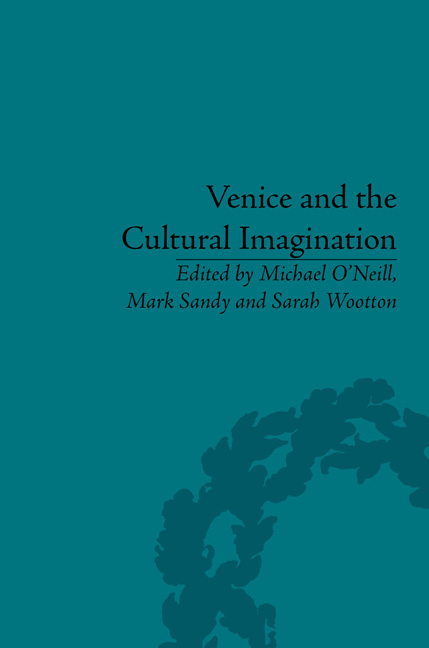Book contents
- Frontmatter
- CONTENTS
- Acknowledgements
- List of Figures
- Notes on Contributors
- Introduction
- 1 A ‘More Beloved Existence’: From Shakespeare's ‘Venice’ to Byron's Venice
- 2 Reimagining Venice and Visions of Decay in Wordsworth, the Shelleys and Thomas Mann
- 3 J. M. W. Turner and the ‘Floating City’
- 4 Venice and Opera: Tradition, Propaganda and Transformation
- 5 Venice, Dickens, Robert Browning and the Victorian Imagination
- 6 ‘The Lamp of Memory’: Ruskin and Venice
- 7 Edith Wharton's ‘Venetian Backgrounds’
- 8 Henry James's Venice and the Visual Arts
- 9 The Myth of Venice in the Decline of Eliot and Pound
- 10 Representations of Venice in Daphne du Maurier's Don't Look Now and Nicolas Roeg's Screen Adaptation
- Notes
- Select Bibliography
- Index
6 - ‘The Lamp of Memory’: Ruskin and Venice
- Frontmatter
- CONTENTS
- Acknowledgements
- List of Figures
- Notes on Contributors
- Introduction
- 1 A ‘More Beloved Existence’: From Shakespeare's ‘Venice’ to Byron's Venice
- 2 Reimagining Venice and Visions of Decay in Wordsworth, the Shelleys and Thomas Mann
- 3 J. M. W. Turner and the ‘Floating City’
- 4 Venice and Opera: Tradition, Propaganda and Transformation
- 5 Venice, Dickens, Robert Browning and the Victorian Imagination
- 6 ‘The Lamp of Memory’: Ruskin and Venice
- 7 Edith Wharton's ‘Venetian Backgrounds’
- 8 Henry James's Venice and the Visual Arts
- 9 The Myth of Venice in the Decline of Eliot and Pound
- 10 Representations of Venice in Daphne du Maurier's Don't Look Now and Nicolas Roeg's Screen Adaptation
- Notes
- Select Bibliography
- Index
Summary
Throughout his life, Ruskin responded with unusual intensity to the association between ideas and places. His mind never floated among abstractions. He framed his arguments among the distinctive details of architectural ornament or unique configurations of landscape – the hills of the Lake District, the cathedrals of England or Northern France, the mountains and glaciers of Switzerland. They formed his imagination over years of close observation, often dating back to childhood and adolescence. Chief among them was Venice. One of the formative grounds of Ruskin's authority as a critic was his long relationship with Venice, the most glamorous and evocative of all Italian cities. The connection had a compelling personal force, but it also carried far-reaching material and political consequences for his readers. It was in thinking about the canals and palaces of Venice that Ruskin formulated many of his ideas about architecture, about the vitality of labour, about the work of the imagination and about the uses of history. Some of the concepts that took shape over the course of his prolonged study of Venice are still with us. Many nineteenth-century Gothic buildings, ecclesiastical, civic or domestic, were designed according to principles that Ruskin articulated in relation to his study of Venetian architecture. Less visibly, but just as significantly, much early British socialism, as it was conceived by William Morris and developed through the first years of the Labour party, was influenced by the insights of Ruskin's Venetian work.
- Type
- Chapter
- Information
- Venice and the Cultural Imagination'This Strange Dream upon the Water', pp. 95 - 108Publisher: Pickering & ChattoFirst published in: 2014



